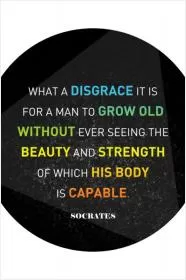Beauty is a short lived tyranny

Beauty is a short lived tyranny
In the context of Socrates, the idea that "beauty is a short-lived tyranny" holds a significant amount of truth. Socrates, the ancient Greek philosopher known for his wisdom and critical thinking, often challenged societal norms and beliefs, including those surrounding beauty and physical appearance.Socrates believed that true beauty lies within a person's soul and character, rather than in their outward appearance. He argued that physical beauty is fleeting and superficial, while inner beauty, such as wisdom, virtue, and moral character, is everlasting and more valuable.
Socrates' philosophy on beauty can be seen in his famous quote, "Beauty is a short-lived tyranny." This statement suggests that the obsession with physical beauty can be oppressive and limiting, as it often leads to vanity, superficiality, and a focus on external appearances rather than inner qualities.
Socrates believed that true happiness and fulfillment come from cultivating virtues such as wisdom, courage, and justice, rather than from seeking validation and approval based on one's physical appearance. He encouraged his followers to look beyond the superficial and to strive for inner beauty and moral excellence.
In today's society, the concept of beauty as a short-lived tyranny is still relevant. With the rise of social media and the pressure to conform to unrealistic beauty standards, many people are consumed by the pursuit of physical perfection. This obsession with outward appearance can lead to feelings of inadequacy, low self-esteem, and a constant need for validation from others.
Socrates would argue that true beauty is not found in flawless skin, perfect features, or a certain body type, but in the qualities that make a person truly virtuous and admirable. By focusing on developing inner beauty and moral character, rather than chasing after fleeting physical beauty, individuals can find true happiness and fulfillment in their lives.












 Friendship Quotes
Friendship Quotes Love Quotes
Love Quotes Life Quotes
Life Quotes Funny Quotes
Funny Quotes Motivational Quotes
Motivational Quotes Inspirational Quotes
Inspirational Quotes